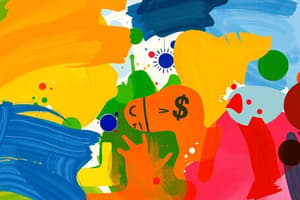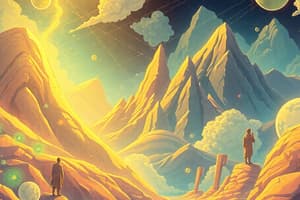Podcast
Questions and Answers
What does microeconomics primarily focus on?
What does microeconomics primarily focus on?
- The decisions of individual consumers and businesses (correct)
- Government policies affecting the economy
- Aggregate indicators of the economy
- Global trade and its effects
Which economic system is characterized by government control over all major decisions?
Which economic system is characterized by government control over all major decisions?
- Decentralized Economy
- Mixed Economy
- Market Economy
- Planned Economy (correct)
What is meant by opportunity cost?
What is meant by opportunity cost?
- The value of the next best alternative forgone when making a decision (correct)
- The total cost of a product in the market
- The highest price consumers are willing to pay
- The overall budget allocated to a project
Which of the following is an example of a macroeconomic indicator?
Which of the following is an example of a macroeconomic indicator?
What do incentives in economics refer to?
What do incentives in economics refer to?
Which economic theory supports government intervention to manage economic downturns?
Which economic theory supports government intervention to manage economic downturns?
What does GDP measure?
What does GDP measure?
Which of the following statements is true about globalization?
Which of the following statements is true about globalization?
Flashcards are hidden until you start studying
Study Notes
Definition
- Economics is the study of how individuals, businesses, governments, and societies allocate scarce resources.
Branches of Economics
-
Microeconomics
- Focuses on individual and business decisions.
- Examines supply and demand, price formation, and consumer behavior.
-
Macroeconomics
- Studies the economy as a whole.
- Analyzes aggregate indicators like GDP, unemployment rates, inflation, and fiscal policy.
Key Concepts
-
Scarcity
- Limited resources vs. unlimited wants necessitating choices.
-
Supply and Demand
- Supply: The amount of a product that producers are willing to sell.
- Demand: The amount of a product consumers are willing to buy.
- Price is determined by the interaction of supply and demand.
-
Opportunity Cost
- The cost of the next best alternative forgone when making a decision.
-
Incentives
- Factors that motivate individuals or businesses to take certain actions.
Economic Systems
-
Market Economy
- Decisions are made based on supply and demand with minimal government intervention.
-
Planned Economy
- Government controls all major economic decisions.
-
Mixed Economy
- Combines elements of both market and planned economies.
Economic Indicators
-
Gross Domestic Product (GDP)
- Measures the total value of all goods and services produced in a country.
-
Inflation Rate
- The rate at which the general level of prices for goods and services rises.
-
Unemployment Rate
- The percentage of the labor force that is jobless and actively seeking employment.
Economic Policies
-
Monetary Policy
- Managed by central banks, involving the management of money supply and interest rates.
-
Fiscal Policy
- Government spending and tax policies used to influence economic conditions.
Theories and Models
-
Classical Economics
- Emphasizes free markets, self-regulating behavior of markets.
-
Keynesian Economics
- Advocates for active government intervention to manage economic downturns.
-
Supply-Side Economics
- Focuses on boosting supply to stimulate economic growth.
Current Trends
- Globalization and its impact on local economies.
- The rise of digital and gig economies.
- Increasing importance of sustainability and environmental considerations in economic policies.
Economics Definition
- The study of how individuals, businesses, governments, and societies make decisions about allocating scarce resources
Branches of Economics
- Microeconomics: Focuses on individual and business decisions
- Examines supply and demand, price formation, and consumer behavior
- Macroeconomics: Studies the economy as a whole
- Analyzes aggregate indicators like GDP, unemployment rates, inflation, and fiscal policy
Key Concepts
- Scarcity: Limited resources vs. unlimited wants, leading to choices
- Supply and Demand: Determines market prices
- Supply: The amount producers are willing to sell
- Demand: The amount consumers are willing to buy
- Opportunity Cost: The value of the next best alternative forgone when making a decision
- Incentives: Factors that motivate individuals or businesses to take action
Economic Systems
- Market Economy: Decisions based on supply and demand with minimal government intervention
- Planned Economy: Government controls all major economic decisions
- Mixed Economy: Combines elements of both market and planned economies
Economic Indicators
- Gross Domestic Product (GDP): Measures the total value of all goods and services produced in a country
- Inflation Rate: The rate at which the general level of prices for goods and services rises
- Unemployment Rate: The percentage of the labor force that is jobless and actively seeking employment
Economic Policies
- Monetary Policy: Managed by central banks, involves the management of money supply and interest rates
- Fiscal Policy: Government spending and tax policies used to influence economic conditions
Theories and Models
- Classical Economics: Emphasizes free markets and self-regulating behavior
- Keynesian Economics: Advocates for active government intervention to manage economic downturns
- Supply-Side Economics: Focuses on boosting supply to stimulate economic growth
Current Trends
- Globalization: Impacting local economies
- Digital and Gig Economies: Rising in importance
- Sustainability and Environmental Considerations: Increasingly impacting economic policies
Studying That Suits You
Use AI to generate personalized quizzes and flashcards to suit your learning preferences.




